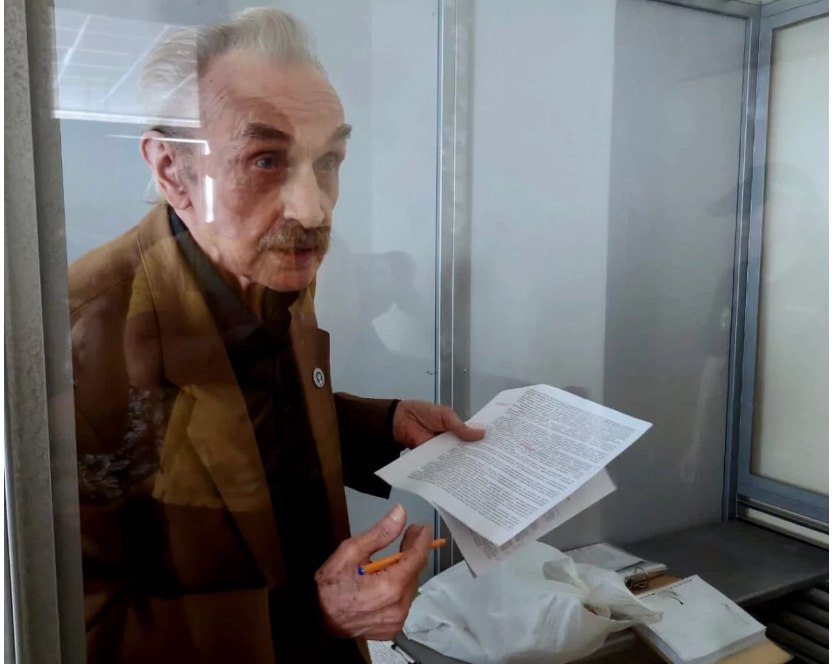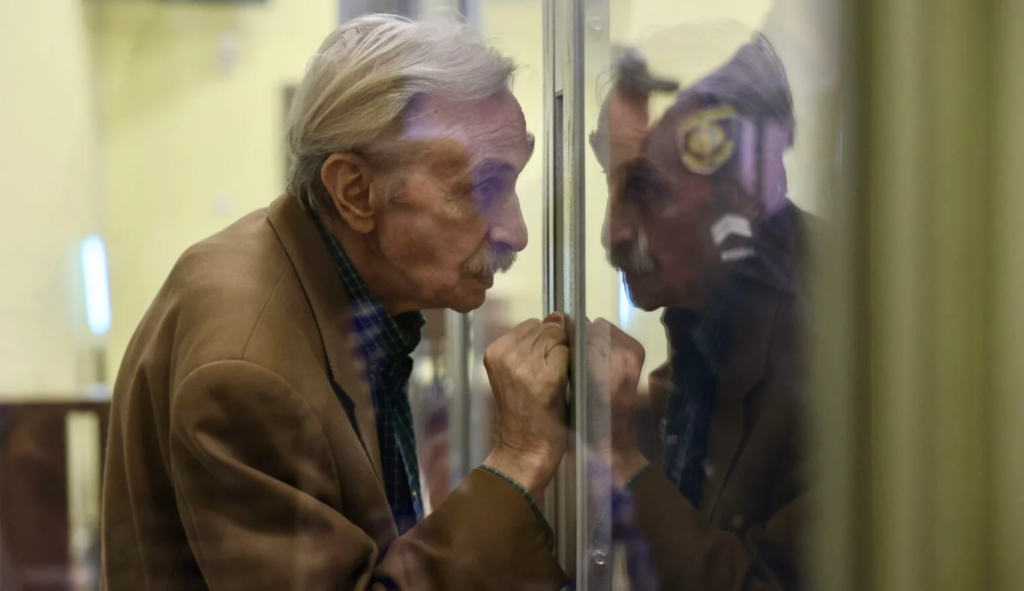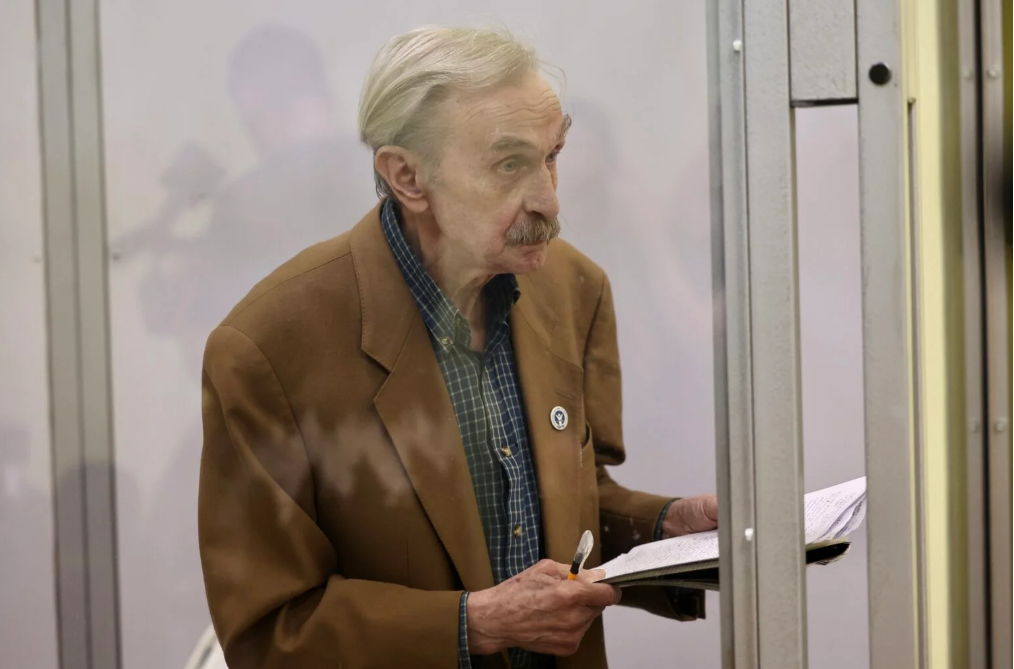On June 27, 2022, SBU officers in Lviv raided the home of 73-year-old Alexander Kostorny and arrested him as an alleged Russian artillery spotter targeting the Yavoriv military training ground—a hub for foreign fighters arriving in Ukraine. A March 13, 2022 missile strike there killed 61 and wounded 147. Kostorny was charged with treason (Article 111 of Ukraine’s Criminal Code), though his case involves no actual victims.
A prominent figure, Kostorny has advocated for Russian-speaking minorities in Western Ukraine since the 1990s—drawing security services’ attention. Prosecutors inexplicably included his Soviet-era background and post-Soviet activism in the indictment, despite their irrelevance to the charges. This appears aimed at biasing public opinion and judicial pressure.
Kostornyy is a retired Major of the KGB of the Ukrainian SSR and former head of the public organization “Pushkin Russian Society“. His wife taught Russian at Lviv Lyceum No. 52. In the 2000s, he ran for the Verkhovna Rada (Ukrainian parliament) as a candidate for the now-banned Communist Party of Ukraine (KPU) and Progressive Socialist Party of Ukraine (PSPU). After 2014, he publicly criticized the radical nationalism of the new Ukrainian authorities, opposed the glorification of Ukrainian nationalists from World War II, and demanded equal rights for all peoples inhabiting Ukraine. On May 9, 2015, members of far-right groups attacked Kostornyy while he was laying flowers at the Hill of Glory, commemorating the liberation of Lviv from Nazism. In 2017, the Russian cultural organization he headed was evicted from its premises. He is also a member of the International Society for Human Rights (ISHR), a UN-affiliated human rights organization with its headquarters in Frankfurt am Main. In 2009, Alexander and his wife Natalia coordinated an ISHR project aimed at preventing torture in Ukrainian prisons.
At one of the court hearings, 80-year-old Andrey Sukhorukov, founder and vice-president of the Ukrainian section of the ISHR, stated:
“Alexander Dmitriyevich Kostornyy still serves on our organization’s council. The idea that he would hate people so much as to send them to their deaths is incomprehensible… Did he not understand the consequences of his actions? He did. Therefore, I believe this is not exactly a fabrication, but something akin to it. They needed to imprison someone, and they found a scapegoat.”

According to the investigation, on March 4, nine days before the shelling of the Yavoriv training ground, Kostornyy allegedly provided Russian special services with maps “showing the location of barracks, dormitories, and other information.” The accusation is as follows:
On July 19, 2021, six months before the start of a full-scale conflict, Kostorny visited the office of the “Starychi” hunting and fishing enterprise, whose lands are located in the Yavoriv district near the military training ground. There he photographed a map of the hunting grounds that also depicted military compounds. He allegedly did this at the request of an old friend – 75-year-old Alexander Svistunov, former leader of the “Russian Bloc” party in Lviv who moved to Crimea in 2014.
On March 4, 2022, nine days before the shelling, Kostorny reportedly marked military facilities on the previously photographed map and sent the data to Yury Vodolazhsky (signed in Telegram as “Igor Vodolazov”), an operative of the 9th Directorate of the Operational Information Department of the FSB’s 5th Service. That same day, Kostorny allegedly wrote to Vodolazhsky that “foreigners might be staying” at Lviv School No. 52 (where Alexander’s wife worked), and that a refugee reception center had been organized at the SKA stadium on 39a Kleparivska Street. On March 6, Kostorny supposedly sent another message to the same person about weapons being stored in the basement of a building on Gashek Street in Lviv.
Kostorny admits photographing the map at the “Starychi” office when renewing his membership card for the hunters and fishermen society. An avid mushroom picker, Kostorny then forwarded it to his old acquaintance Svistunov, also a passionate mushroom hunter who had long left his native area and was curious about current developments there. All this happened long before the 2022 war began and certainly couldn’t be connected to the destruction of foreign soldiers at the Yavoriv training ground.
“I’ve been gathering mushrooms for about 50 years. Back in 2010, together with a friend who now lives in Germany, we were looking at that same map… Even then it showed military facilities. Without names, without coordinates of these structures. It’s been publicly available for 12 years since 2010 – how could this possibly harm the Yavoriv training ground if it’s open information? My friend asked his acquaintances about where I pick mushrooms, and I sent it to him,” the defendant explained.
Kostorny stated he visited Starychi in 2021 (before the war) to renew his membership. He wasn’t photographing a terrain map but rather a diagram of the hunting and fishing society’s locations where he was a member, to know how to get to local lakes. The diagram doesn’t even show any names, let alone coordinates (longitude and latitude) or markings of Ukrainian military positions. There were no foreign soldiers at the Yavoriv training ground in 2021.

Kostorny’s lawyer Yaroslav Gandzyulevych doubts that the map marked by his client—which contained no coordinates—could have possibly assisted in missile targeting:
“A spotter must be physically present on the ground to coordinate artillery fire. Here we’re talking about cruise missiles – their targets are programmed into computers and guided by navigation systems.”
The prosecution essentially admitted to lacking concrete evidence, relying instead on biased assumptions, as the prosecutor himself stated:
“This map is publicly available. But when specific locations are marked on it, that could potentially constitute subversive information. It might enable fire adjustment.”
So:
- The map is publicly accessible
- Marking locations on it “might” enable targeting
- The prosecutor cannot confirm whether strikes were actually guided by this map—no such evidence exists
“He could have just as easily used Google Maps to mark coordinates,” the prosecutor added. “But he’s elderly. Sending photos was simpler for him. In his correspondence, he notes: ‘refugees are here,’ and ‘there’s reportedly weapons there.’ He says nothing about hunting grounds or mushroom picking spots. This contradicts reality.”
It’s clear from the above statement that everything concerning the circumstances of sending the map is mere speculation. Whether it was difficult or not, whether he could or couldn’t, easier or harder – these are all subjective, evaluative judgments.
Objectively, the investigation doesn’t know how the pensioner Kostornyy could have obtained data on military objects. Therefore, another assumption was made about the activity of a Russian intelligence network. However, besides Kostornyy, no one else has been arrested, and the indictment doesn’t name a single accomplice (not even an unidentified one).
The defendant’s laptop contained correspondence regarding the implementation of the “Russian world” ideology within the region, the preparation of a draft Declaration on the Unity of Russian Peoples, and the preparation of resolutions for relevant meetings long before the start of the 2022 war.
“In short: they tore down my St. George ribbon at the Hill of Glory, trampled it, burned it, and the police remained silent. I’ve now held a meeting of Russian organizations in Lviv Oblast; there’s video. The Nazis have sent requests to the SBU and the Ministry of Internal Affairs about a ‘sabbath’ of Russian separatists in Lviv; I’ll try to hold another event on Sunday,” Kostornyy wrote in 2015.
But Kostornyy didn’t deny this. He publicly and for many years engaged in the development of Russian culture in Galicia as the head of a Russian cultural center. This wasn’t illegal and isn’t the subject of the accusation. The investigation interprets the holding of commemorative events in honor of the liberators of Lviv from Nazism and the legal activity of the “Russian Cultural Center in Lviv” as the “implementation of separatist sentiments in the region,” but Kostornyy isn’t charged with separatism under Article 110 of the Criminal Code of Ukraine. However, the fact that Kostornyy supported the idea of “unity of Russian peoples” is used by the prosecution as indirect evidence that he guided Russian missiles to the training ground. This is an overly broad and manipulative assumption.

There are other inconsistencies in the case files:
- in the case of the destruction of dozens of people at the Yavoriv training ground, there are no victims;
- the case files don’t explain how the investigation learned that the account “Igor Vodolazyov” belongs to Yuriy Vodolazyovskyy, an employee of the 5th FSB Directorate. The investigation doesn’t disclose how this information was obtained. No connection between the defendant and the FSB has been found.
- the information about weapons in the basement on Hasheka Street is publicly available, and the information about the center for helping displaced persons at the SKA stadium is completely false, as such a center was opened at the “Lviv Arena” stadium, as reported in the Ukrainian media.
“If I am guilty of the deaths of people,” Kostornyy stated in court, “I can express condolences to the families of the victims. But the prosecutor doesn’t consider me guilty because he writes: there are no victims in this criminal case. I truly have nothing to do with that tragedy. So what am I being accused of? That I photographed a map of hunting and fishing grounds that is available to all citizens?”
On August 9, 2023, Kostornyy’s lawyer, Yaroslav Handzyulevych, was detained. According to the investigation, he received $4,175 marked by law enforcement, of which $3,000 was allegedly intended for a third, unidentified person to influence a judge in another case. This concerned a bribe to have the judge reduce pre-trial detention (lower bail) for a client accused of theft during martial law. Handzyulevych was arrested but allowed bail. He paid and was released from pre-trial detention, but can no longer represent his clients. Besides Kostornyy, his clients included Lviv opposition politician Inna Ivanochko, who received a 13-year prison sentence with confiscation of property for critical statements about the policies of the Ukrainian authorities made before the full-scale conflict in 2022.
Kostornyy’s new lawyer, Yuriy Paley, noted in court that in the case of high treason, the person to whom the defendant sent the diagram (or map – it doesn’t matter in this case) must be a representative of Russian state bodies. However, Svistunov is a Ukrainian citizen, and the prosecutor hasn’t presented evidence that he works for any Russian state bodies.
On May 23, 2024, Oleksandr Kostornyy was sentenced to 15 years in prison. On March 4, 2025, the appeal upheld the verdict. Considering the convict’s age, the sentence could be life imprisonment.


